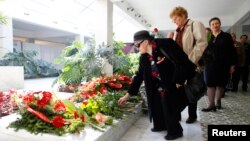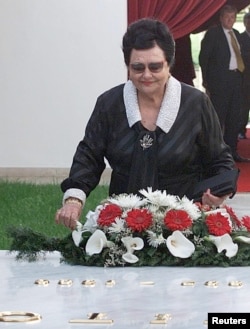BELGRADE —
Jovanka Broz, Yugoslavia's former First Lady who lived virtually forgotten for many years after war tore apart the socialist federation built by her husband Tito, received a state burial on Saturday.
Broz died of heart failure in a Belgrade hospital on Oct. 20, at the age of 88
Thousands of mourners, many from other former Yugoslav republics, gave Broz a final salute as her coffin, covered with red flowers, was carried into the “House of Flowers” compound where she was buried next to her husband Josip Broz Tito.
A World War II veteran, she had held the rank of a Lieutenant Colonel in the Yugoslav army and two medals for gallantry in combat. At her funeral she received full military honors, including a guard of honor by her former war comrades.
“Jovanka was our first lady, our pride and the representative of our state... an important part of our history that we have discarded and forgotten,” Serbian Prime Minister Ivica Dacic said in a eulogy.
After Tito's death in 1980, Broz lived largely in isolation, shut away in a crumbling state-owned villa in the Serbian capital without a passport or ID.
She looked on as nationalist tensions tore apart Yugoslavia in the 1990s, spawning seven new states during a decade of war and ethnic cleansing that killed more than 125,000 people.
Nationalists chipped away at Tito's reputation and legacy, deconstructing the personality cult built around him in an effort to undermine the mantra of "Brotherhood and Unity" that had underpinned the old Yugoslavia.
Croatian-born Broz was finally granted a Serbian passport in 2009.
Broz died of heart failure in a Belgrade hospital on Oct. 20, at the age of 88
Thousands of mourners, many from other former Yugoslav republics, gave Broz a final salute as her coffin, covered with red flowers, was carried into the “House of Flowers” compound where she was buried next to her husband Josip Broz Tito.
A World War II veteran, she had held the rank of a Lieutenant Colonel in the Yugoslav army and two medals for gallantry in combat. At her funeral she received full military honors, including a guard of honor by her former war comrades.
“Jovanka was our first lady, our pride and the representative of our state... an important part of our history that we have discarded and forgotten,” Serbian Prime Minister Ivica Dacic said in a eulogy.
After Tito's death in 1980, Broz lived largely in isolation, shut away in a crumbling state-owned villa in the Serbian capital without a passport or ID.
She looked on as nationalist tensions tore apart Yugoslavia in the 1990s, spawning seven new states during a decade of war and ethnic cleansing that killed more than 125,000 people.
Nationalists chipped away at Tito's reputation and legacy, deconstructing the personality cult built around him in an effort to undermine the mantra of "Brotherhood and Unity" that had underpinned the old Yugoslavia.
Croatian-born Broz was finally granted a Serbian passport in 2009.






